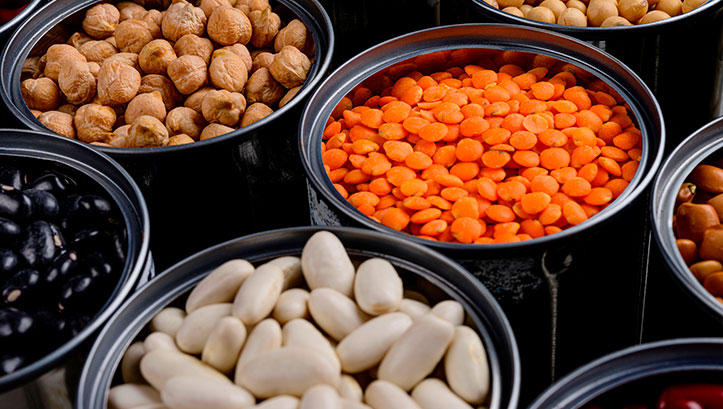The processing of legumes generally involves a series of steps that include receiving raw legumes, cleaning, peeling, cooking or heat treatment, cooling, packaging and, in some cases, milling to obtain flours or products powdered.
- Reception and Storage: Raw legumes are received at the processing plant and temporarily stored in silos or appropriate storage areas.
- Cleaning and Classification: Legumes go through a series of cleaning machines, such as sieves and air separators, to remove impurities such as stones, soil and plant fragments. Grading machines then separate the legumes into different categories based on their size and quality.
- Hydration: The legumes are hydrated in storage tanks with soft water. After the time necessary for the product to be at its proper hydration point, the legumes are transported by absorption system to the next processing phase.
- Cooking: Raw legumes are cooked or subjected to heat treatment to soften them and improve their texture. The cooking equipment is hot water immersion systems.
- Cooling: After heat treatment, the legumes are quickly cooled to stop the cooking process and maintain their integrity.
- Packaging: Processed legumes are packaged in suitable packaging, which may be bags, jars, cans or other types of packaging.
- Labeling and Coding: Labeling and coding equipment is used to apply labels with product information, expiration dates and lot codes.
- Quality Inspection: Visual inspection machines and quality analysis systems verify that products meet quality standards.
- Sterilization: The containers are sterilized to guarantee the safety of the product.
- Storage and Distribution: Processed products are stored in suitable storage areas before being distributed to sales outlets or distributors.
The machinery used in a legume processing line will vary depending on the type of legume and the final product to be obtained. It is essential to maintain high standards of quality and food safety throughout the process. Investment in appropriate technology and staff training are essential for success in pulse processing.
Technology plays a fundamental role in each of these stages, which is why our equipment is specially designed to increase efficiency, reduce manual work and ensure food quality and safety at all times.The machinery used in the processing of legumes has been developed to automate and optimize the various stages involved in the preparation and packaging of these foods. Among the most common machines we design for legume processing are:
- Hydration tanks: Systems for transferring hydrated legumes to the processing line.
- Immersion scalders: Continuous rotating equipment, which is designed and built according to the different capacities that our clients request.
- Cooling: Using vibration or belt equipment, the temperature of the product is lowered.
- Packaging: From the depalletizing of empty containers, transportation, washing and sanitization of the containers, including packaging either by linear or volumetric rotary system.
- Addition liquid: Tanks for the preparation of addition liquids, and continuous dispensers, before the closing phase.
- Washing and drying containers: We build full container washing and drying machines.
- Sterilizers: They are used to ensure the safety and shelf life of canned products.
- Labelers and coding machines: These machines apply labels with product information and lot codes or expiration dates to containers.
- Inspection and quality control: Machines that perform visual and quality inspections to eliminate defective products.
- Palletizing: Crucial stage in the supply chain that involves organizing and stacking processed pulses on pallets for efficient transportation and storage.
- Conveyors and handling systems: These systems allow the efficient movement of legumes and products through the different stages of processing.
Pulse processing machinery has become essential for the mass production of these foods, ensuring their quality, safety and efficiency in the food supply chain.
Starting from specific specifications in each case, we carry out the design and comprehensive production of Complete Lines that cover the specific needs of each client. Tell us about your needs and we will carry out a personalized project that adapts to your requirements. If you wish, we can work together from the beginning of the activity, renew your equipment or adapt to your new needs. Together, we are stronger. Each Project is unique and personal. Our capacity and experience enable us to tackle any possible project within the Food sector.
